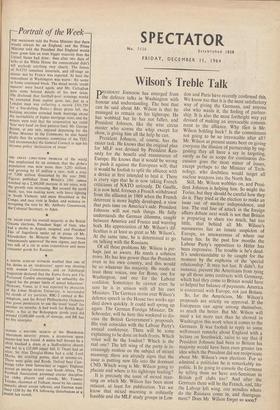Wilson's Treble Talk
PRESIDENT JOHNSON has emerged from the defence talks in Washington with honour and understanding. The best that can be said about Mr. Wilson is that he managed to remain on his tightrope. He has wobbled but he has not fallen, and President Johnson, like the wise circus master who scorns the whip except for show, is giving him all the help he can. President Johnson, of course, has the easier task. He knows that the original plan for MLF was devised by President Ken- nedy for the benefit and reassurance of Europe. He knows that it would be wrong to push it against the European will, that it would be foolish to split the alliance with a device at first intended to heal it. There is every sign that he is now taking French criticisms of NATO seriously. De Gaulle, it is now held, foresees a French withdrawal from the alliance in 1969 when the French deterrent is more highly developed, a view that puts time on America's side. President Johnson will not rush things. He fully understands the German dilemma, caught between America and France and wanting both. His appreciation of Mr. Wilson's dif- ficulties is at least as great as Mr. Wilson's. At the same time, he is determined to go on talking with the Russians.
Of all these problems Mr. Wilson is per- haps just as aware. He needs a solution more. He has less power than the President even in his own country, and this would be so whatever his majority. He needs at least three voices, one for Bonn, one for Washington, and one for the Labour coalition. Sometimes he cannot even be sure he is in unison with all his own Ministers. The German storm over Wilson's defence speech in the House two weeks ago died down quickly. It could well spring up again. The German Foreign Minister, Dr. Schroeder, will be here this weekend to dis- cuss the British Government's proposals. His visit coincides with the Labour Party's annual conference. There will be some explaining to be done on both fronts. Which voice will be the loudest? Which is the real one? The left wing of the party is in- creasingly restless on the subject of mixed manning; there are already signs that the issue is putting new life into the dormant CND. Which wing is Mr. Wilson going to placate and where is his tightrope leading?
It is precisely the issue of mixed man- ning on which Mr. Wilson has been most reticent, at least for publication. Yet we know that mixed -manning is militarily feasible and the MLF study groups in Lon- don and Paris have recently confirmed this. We know too that it is the most satisfactory way of giving the Germans, and anyone else who wants it, the feeling of partner- ship. It is also the most forthright way yet devised of making an irrevocable commit- ment to the alliance. Why thten is Mr. Wilson holding back? Is the commitment not going to be so irrevocable after all? Mr: Wilson at present seems bent on giving everyone the illusion of partnership by sug- gesting they all have a say in targeting, surely as far as scope for continuous dis- cussion goes the most minor of issues, except ,perhaps to the Minister of Tech- nology, who doubtless would target all nuclear weapons into the North Sea.
Still, Mr. Wilson wobbles on, and Presi- dent Johnson is helping him. So might the Tories, but they should be careful how they do it. They tried at the election to make an issue out of nuclear independence, and lost. The real line of attack in the foreign affairs debate next week is not that Britain is preparing to share too much, but too little, that behind all Mr. Wilson's manceuvres lies an innate suspicion of Europe, an unawareness of where our future lies. In the past few months the Labour Party's opposition to Hitler has been impressive. The trouble is he's dead. It's understandable to be caught for the moment by the euphoria of the 'special relationship.' It may not last. It didn't, for instance, prevent the Americans from tying up all those arms contracts with Germany, which had they come to Britain would have so helped her balance of payments. America is concerned with Europe, not just Britain.
So, for the Americans, Mr. VVilsop's proposals are strictly on approval. If the Europeans can agree among themselves, so much the better. But Mr. Wilson will need a lot more tact than he showed in Washington this week when it comes to the Germans. It was foolish to reply to some well-meant remarks about England with a lecture on Srnethwick, naive to say that if President Johnson had been in Britain his majority would have been even greater (an idea which the President did not reciprocate about Mr. Wilson's own election). For so admired a politician he is remarkably im- politic. Is he going to console the Germans by telling them we have anti-Semitism in British golf clubs too? And after the Germans there will be the French, and, like the Labour left wing, one wonders where do the Russians come in, and disengage- ment? Does Mr. Wilson forget so soon?




























 Previous page
Previous page